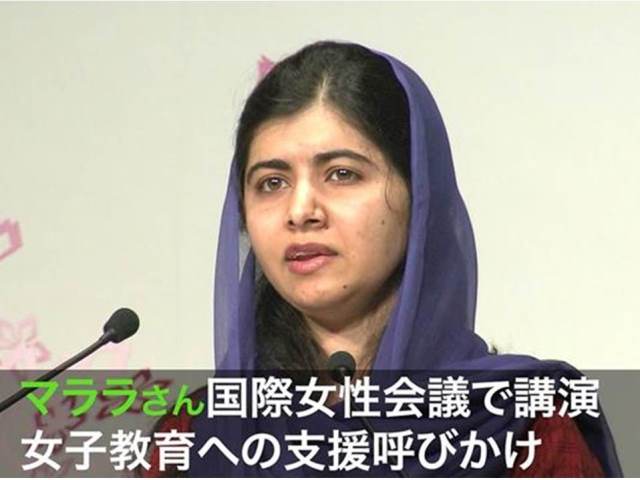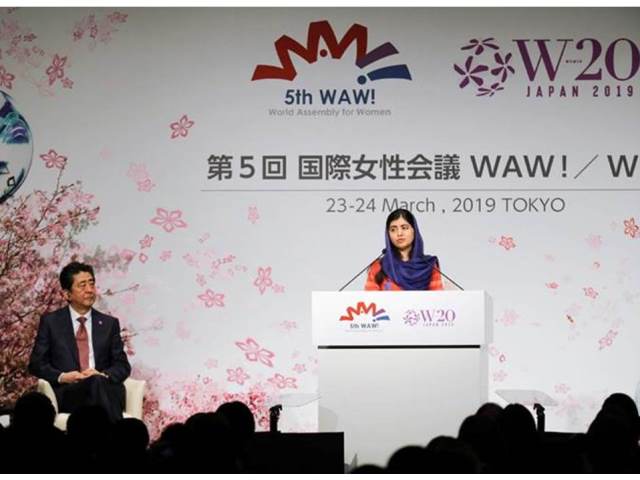来日して講演したマララさんは「今、女子教育に投資すれば、想像できないほどの未来を作ることができる」と訴え、各国に支援を求めた。

先日、マララさんが講演する日本政府主催の行事に行ってきた。その講演会の模様を朝日新聞とJapan Timesが以下の様に報じていた。
*********************************
女性が教育を受ける権利を訴えてノーベル平和賞を受賞したマララ・ユスフザイさん(21)が23日、東京都内で開かれた政府主催の第5回国際女性会議と主要20カ国・地域(G20)に政策提言を行う「Women 20(W20)」の合同セッションで講演した。マララさんは「今、女子教育に投資すれば、想像できないほどの未来を作ることができる」と訴え、各国に支援を求めた。
マララさんはパキスタン出身。女性が教育を受ける権利を訴え、2012年10月にイスラム武装勢力に銃撃された。現在は英オックスフォード大に通う。
講演で「過激派は教育の権利を訴えた私を攻撃した。でも失敗した」と主張。「私の声は大きくなっている。今、学校に行くことのできない1億3千万人の子どもを代表してここにいる」と語った。また、全ての女子が中等教育を受けられれば、30兆ドルの経済効果があるとの試算を紹介。「我々は行動を起こさなければいけない」と呼びかけた。
*********************************

*********************************
Ms. Sakura Murakami of Japan Times staff writer reported on March 23, 2019 that Nobel Peace Prize laureate Malala Yousafzai urged world leaders Saturday to further promote the empowerment of women through education and financial support. Her call came on the first day of the joint World Assembly for Women and Women 20 (W20) summit, which was held in Tokyo with Prime Minister Shinzo Abe in attendance.
“If you want to create a world where all women and girls can shine, where women are driving innovation, or succeed in government and business, our leaders must invest in girls’ education,” Malala said in her opening keynote speech.
“This week, I’m asking G20 leaders to commit new funding to girls’ education” and for the development of the “skills that they need to prepare for the future workforce,” she added.
In his opening speech, Abe echoed the need to invest in women’s education and made clear his commitment to make it a high priority in the agenda for this year’s Group of 20 summit, to be held in Osaka in June.
Speaking of Japan’s commitment to making education accessible for young women in developing countries, Abe said that Japan will “provide high quality education and opportunities for resource development to 4 million women in developing countries by 2020.”
“Better education is not just about social policy, but also crucial to sustainable economic growth,” he added, referring to the findings of a World Bank report released last year claiming that the global cost of women who cannot complete 12 years of education amounts to $15 trillion to $30 trillion in lost lifetime earnings.
“I will be raising this issue at the G20 to make sure with other leaders that as the G20, we envision a world where all women across the globe can have access to good education for 12 years,” he said.
Representatives of the W20 network also submitted to Abe a communique that endorsed previous G20 declarations and made new suggestions on how to improve gender equality and empower women.
In the World Economic Forum’s annual World Gender Gap Index in 2018, Japan was ranked 110 out of 149 countries, although it had moved up four spots from the previous year mainly due to narrower wage gaps and an increase in women’s employment.
This year’s communique has a particular focus on women and technology, and pushes for the “inclusive and responsible use of all new technologies, including AI … to ensure no woman is left behind,” and touches on the need to “close the digital gender gap” to ensure “women can exercise their digital rights.”
The communique also suggests putting governance mechanisms for the G20 in place to make sure the declarations and commitments are being met, as well as removing “systemic legal and social barriers in the labor market.”
Other suggestions included encouraging the financial inclusion of women, such as access to investment and promoting entrepreneurship, pushing for life-long learning and gender equality in schools, as well as ending violence against women and girls in all areas of society, including online.
*********************************




